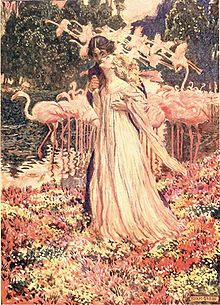Eleonora (Poe)
Eleonora is a short story by Edgar Allan Poe . It was first published in 1841. It is about the paradox of fidelity in unfaithfulness.
action
The nameless first-person narrator describes himself as insane and believes he can only reliably report the first part of his existence, namely the time when he lived in a remote mountain valley together with his cousin Eleonora, who was of unearthly beauty and grace . When Eleonora turned 15 and the first-person narrator 20, love awakened between them - and the valley, which until then had only been adorned with multicolored grass, had developed tropical colourfulness, even flamingos found a ... But Eleonora fell ill and her illness was accompanied by anticipatory jealousy : She couldn't bear the thought that the first-person narrator would love another woman after her death. Therefore the first-person narrator swore never to love anyone other than Eleonora:
- “And I asked the Almighty, the Lord of the Worlds, to testify to the solemn seriousness of my oath. In his name and her name, the name of a saint of the heavenly realms, I swore the curse upon me; if I were to be unfaithful to my promise, I should be punished so terribly that I cannot report about it here. "
Eleonora rewarded him for this with the promise to watch over him from the hereafter and to visit him. Then she died.
This, however, begins the second part of the first-person narrator's life, and he assumes no liability for its correct reproduction. For a while he stayed in the valley of the multicolored grass, for a while Eleonora appeared to him there too, but the place had gradually lost all its magic, and the longing for new love had awakened in him, he had the valley left, had entered the service of a king - and there he got to know and love the splendid Lady Ermengarde with an even more passionate love than that which he had felt for Eleonora, and had her, less forgetting his vow than consciously ignoring it, married. One night he heard Eleanor's sigh and her voice again, saying to him:
- “Sleep in peace! - for the spirit of love rules over all things; and when you, Ermengarde, press her to your passionate heart, for reasons that will only be revealed to you in heaven, you are released from your vow to Eleonora. "
These words indicate a reincarnation of Eleonoras in the form of Lady Ermengarde in the memory or imagination of the narrator.
interpretation
Baudelaire had already suspected that in this story Poe was dealing with the question of loyalty to his seriously ill wife and cousin Virginia , because while she was still alive he had enthusiastic relationships with admirers such as B. to the poet Frances Sargent Osgood , for whom he had to justify himself on the basis of anonymous letters to Virginia.
- “Quite a few writers have always followed the image of a single woman throughout their love affairs. The assumption that the soul is always the same residing in different bodies can be taken as the plea of a conscience that fears to be unfaithful to a beloved memory. ”(Baudelaire, quoted from Marie Bonaparte : Edgar Poe)
motto
The Latin motto Sub conservatione formae specificae salva anima translates as: Soul preserved while maintaining the (outer) form. Raymond Lully is the French name form of Ramon Llull .
Others
The name Ermengarde goes back to the Old High German ermen meaning “all-encompassing” or “universal”. The reincarnation of Eleonoras in the form of Lady Ermengarde thus points to the romantic idea of poetry as a repetition of a universal, mystical unio or union with nature; the resurrected Eleonora realizes herself as Lady Ermengard in an even more radiant and all-encompassing figure as a mystical beauty and reflection of a divine idea .
See also
German translations
- Eleonora . Transferred by Helmut Wiemken and Christel Wiemken. In: Edgar Allan Poe: Master narratives , ed. by Günter Blöcker , German Book Association, Berlin a. a. 1960, pp. 398-405. [Reference edition used here]
Web links
Individual evidence
- ^ Eleonora · Eleonora [1941] . Translated into German by Helmut Wiemken and Christel Wiemken. In: Edgar Allan Poe: Master narratives, ed. by Günter Blöcker , German Book Association, Berlin a. a. 1960, pp. 398-405, here p. 402.
- ^ Eleonora · Eleonora [1941] . In: Edgar Allan Poe: Master narratives, ed. by Günter Blöcker, German Book Association, Berlin a. a. 1960, pp. 398-405, here p. 405.
- ↑ See the information and evidence from Karl Heinz Göller : Poe · Ligeia . In: Karl Heinz Göller et al. (Ed.): The American short story . August Bagel Verlag, Düsseldorf 1972, ISBN 3-513-02212-3 , p. 79.
